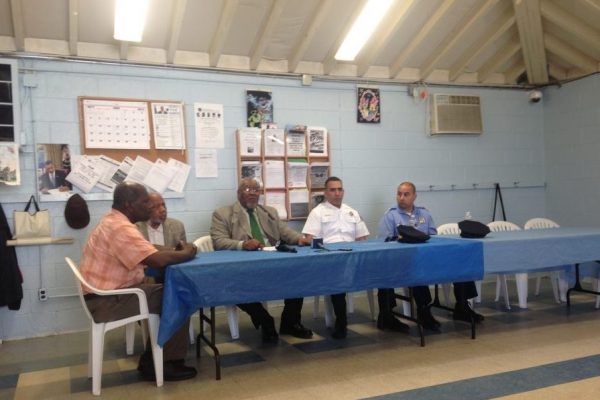Crime Blocks: Removing the Menace
In addition to the trash strewn about the yard, a foul stench of dog droppings and stale cigarettes emanated from the pigeon-infested house whenever the squatters opened their front door. Their frequent visitors flopped on stoops of adjacent homes, sometimes in a zombie-like state, occasionally leaving vomit in their wake. Neighbors saw the elderly owner of the property — who claimed he could not rid himself of the unwanted guests — wandering the street, barefoot, at 5AM.
After nearly two years of these squatters occupying the house on the 2800 block of Almond Street in Port Richmond, neighbors felt like prisoners in their own homes. In a cry for help, one neighbor wrote a letter to several city and state representatives, describing the squatters as, “irrational, vindictive bullies who seem to have no fear of consequences.” Adding, “and I truly fear for my family’s safety.”
The squatters, Andrea and Patrick (whose last names we’re withholding as their current incarceration makes it difficult to get their side of the story), occupied the house with Andrea’s son, about age 10, their rarely seen dog, and the homeowner, who we’ll call “Anthony.”
Several neighbors reported that Anthony confided in them that Andrea and Patrick were only supposed to stay for a week and then would not leave.
[Ed. note: “Anthony’s” family chose not to speak for this article due to privacy concerns and needing closure.]
The frustrated residents did assert themselves from time-to-time, but with little success. In one neighborhood dust-up caught on video, Andrea can be heard saying, “every one of these fucking neighbors are gonna get it!”
Upon hearing of the trouble from the residents, Marc Collazzo, of State Rep. John Taylor’s office, began investigating. Sitting in his Bridesburg office, he and two residents, who we’ll call “Pete” and “Maria,” shared details of their daily nightmare.
“We quickly determined that this was not just your run-of-the-mill neighborhood dispute,” Collazzo said. “We knew getting [the squatters] out was good for the neighborhood.”
Collazzo keeps a roster of people to contact when problematic neighbors come to his attention. The appropriate district police captain is always one of the first calls. So is the Public Nuisance Task Force (PNTF), which is a unit in the Office of the District Attorney.
“Then it becomes more about the specific situation,” Collazzo explained. For example, “People always complain about Section 8 housing … but that gives me another [option] to go with for leverage” as do other landlord-tenant situations. “But in this case the house was owned by ‘Anthony,’ which initially made it difficult.”
In addition to PPD and PNTF, Collazzo contacted CLIP (Community Life Improvement Programs) due to the trash in the yard. Since a child lived on the property, Philadelphia Dept. of Human Services (DHS) got involved. The dog’s involvement also made animal control an option. Because there was suspicion and evidence that Anthony may have been unwillingly or unwittingly complying with the squatter’s demands, Pennsylvania Corporation for Aging (PCA) also got involved.
Unfortunately, when folks from PCA showed up, Anthony would claim to be “okay,” though he was never away from Andrea or Patrick during visits.
Finally, since Patrick was on probation a closer eye was put on his compliance with the court’s orders. But the most significant portion of power came from the neighbors themselves.
“Bringing it up is only step one,” Pete said.
“The whole ‘woe is me’ stuff is only five percent of it,” Maria added. “It has to mean more to you than just a Facebook post.”
Initially, residents would call police on individual disturbances. But the trouble almost always disappeared before the cops could get there. Then more problems started popping up. Another home across the street, where an elderly person suffering from cancer resided, also had a troubled woman named Jacki staying there. Less than a block away, on Cambria, drug dealers started staying in an apartment. Apparently, they had grown tired of hiding their transactions and the rate of open sales in daylight increased.
“More foot traffic, a lot of out-of-state tags, and who they associated with brought a different feel to the block. A lot of intimidation,” Pete said.
Another disturbing development was how comfortable the squatters became with their own new “normal.” They organized a block party and started knocking on doors demanding money for the anticipated expenses.
“Jacki was very persuasive,” Maria said. “She would even say she was going to enter rehab and that she was just waiting for her ID. I found myself half believing her.” Both Pete and Maria were hopeful the group would clean themselves up. But Pete said it was, “just wishful thinking.”
The squatters also started hosting daily gatherings around a baby pool in front of the house. But while the absurd visual of grown people playing in a baby pool on a city sidewalk provided a brief comic relief for some of the neighbors, the problem was becoming more immersed.
Pete and Maria knew they needed to amp up their efforts.
“I’m not one to pass judgement, but I’m also not a fool with living in the city and seeing what was going on,” Pete said.
They started by building a coalition of neighbors, which was not always easy. One of their early actions was sending an anonymous letter to other residents detailing the issues and listing specific people and agencies to contact.
“Not all neighbors thought [Patrick, Andrea, et al] were dealing drugs,” Pete said. “[Some] just thought they were loud and obnoxious and cursed a lot.”
Taking the advice of the police and Collazzo, the neighbors started taking videos and pictures, jotting down license plates and noted more details in times of activity. Collazzo also called the probation office about Patrick who coincidentally had missed his appointment that morning.
“It was then that Probation started taking a great interest in the property,” Collazzo said. “They could actually send an armed officer who would be able to enter the property.”
Other agencies started increasing their well-checks of the elderly Anthony as well.
The squatters started feeling the heat and sometimes made sales through a slit in the screen door. The buyers would knock and pretend have a conversation while exchanging drugs and cash through the slit.
Andrea and Jacki started having noticeably louder conversations with their legion of acquaintances when neighbors would walk to their cars.
“They were saying threatening things, clearly trying to get a rise or reaction out of someone,” Pete explained. “To everyone’s credit, [the other residents] pretty much stayed professional and just kept moving.”
One resident, who had confronted people for loitering on his property, woke up to slashed tires on their vehicle. Surveillance footage showed Jacki crouched down near the tires for several minutes overnight. On another occasion a squatter called the police on a neighbor, citing “defamation of character” as the offense. Jacki started knocking on elderly neighbor’s doors demanding money and food.
“It was getting to the point that someone was going to get hurt,” Collazzo said.
Collazzo got a break when checking the property details. Anthony was divorced and the couple had not yet dealt with the property. Having the ex-wife file to have the property divided gave leverage to Rep. Taylor’s office in assisting the neighbors. Anthony never responded to his ex-wife’s court action so she, by default, took control of the property.
Collazzo also advised Rep. Taylor that it was time for direct involvement. The representative drove up the street and saw enough to make contact with Anthony, who he knew on a personal level from interactions in the past. He composed a letter and made a phone call to Anthony detailing what could happen if the problem was not taken care of immediately.
“He repeatedly told him, ‘If everyone behaves there won’t be a problem. If they don’t behave, there will be a problem,’” Collazzo recalled. “I think he said it six times to him.”
In the meantime, the neighbors got their own break after the squatters secretly called the police on a neighbor’s car that was partially blocking another neighbor’s driveway.
“They were trying to cause a fight between the neighbors by pretending that the [neighbors] called on each other,” Maria said. “But [we] saw them on surveillance scoping out the car right before they called.”
Coincidentally a community officer from the 24th District came by to check on Anthony. The squatters thought the officer was there for the car and driveway and inadvertently tipped off that they called. A neighborhood argument ensued.
Following these incidents, the police began to get more involved. The Narcotics Unit stepped up surveillance of the property. Within days, the squatters, changing their routine a bit, walked down the street and sold drugs right in front of the narcotics officer. Two days later Andrea and Patrick were arrested and charged with possession with intent to deliver, conspiracy, corruption of minors and other related charges.
Police arrested Jacki some days later for an assault and robbery of an elderly person. She was charged with several felonies and misdemeanors: Robbery-Inflict Serious Bodily Injury, Aggravated Assault, Burglary (with a person present), Criminal Trespass, Possession of and Instrument of Crime, Terroristic Threats, Recklessly Endangering Another Person and other related charges.
With their block cleared of the trouble, Pete, Maria and Collazzo reflected on what worked and why.
“At some point if nobody helped [residents of the block], they’re gonna get frustrated, give up, or worse from our point of view, they’re going to move,” Collazzo said. “We don’t want good people who want to be there moving because the system didn’t help them.”
“City living is toleration of what you can tolerate,” Pete said. “You always get the people that are quick to bash [the city]. ‘The city’s going [down] the tubes and I’m gonna get out,’ but did you try to do something? Not everybody will try or [they] don’t know where to go.”
“I think the group effort helped because it’s a lot to do,” Maria said.
“You can get discouraged and it is discouraging,” Collazzo said. “The lesson is you have to be persistent you can’t give up you have to believe the process will work and we’re here to get you the access to all of the people you need… and we’ll stay on top of it.”
“Some people just throw their hands up,” Collazzo added.
Andrea’s child is believed to be with his or her biological father now.
Anthony appeared to be in better health in the weeks after the arrests, according to Maria and Pete. But most recently it seems he has moved away from the home.
Pete and Maria said the block is quieter now. They hope that it is all over. In the meantime, they plan to help others in the city by sharing their story of how to combat nuisance neighbors.
“We don’t want to continue to fight crime,” Pete laughed. “But I think going to meetings where people [need help] is a good idea.”
It’s about making sure the right people are throwing their hands up.
You can follow Bob Stewart on Twitter @bstew74.










